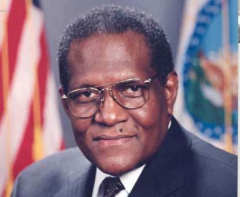
Stillman College will hold its annual Spring Convocation, which commemorates the beginning of a new academic semester, on Thursday, January 23, at 11 a.m. in Birthright Alumni Hall. Dr. George E. Cooper, Executive Director for the White House Initiative on HBCUs (Historically Black Colleges and Universities) will deliver the convocation address.
As part of the leadership team for the White House Initiative on HBCUs, Dr. Cooper works with the presidentially appointed HBCU Board of Advisors and serves as a liaison between the executive branch and HBCUs across the country. He represents the HBCU community at the Department of Education, and helps to shape policy and deploy resources to better serve the students, faculty and families of the greater HBCU community.
“I work with 32 federal departments and agencies as an advocate for HBCUs,” states Dr. Cooper, who says that he and his department members are excited about helping President Obama to reach his goal of assuring that the United States has “the highest proportion of college graduates in the world by 2020.”
Dr. Cooper believes that HBCUs play a critical role in helping the Nation to reach this goal, and says that “promoting the excellence, innovation and sustainability of Historically Black Colleges and Universities” is among his department’s highest priorities.
He states that his department’s mission includes developing sustainable private-sector initiatives and public-private partnerships while promoting specific areas and centers of academic research and programmatic excellence throughout all HBCUs.
Prior to being appointed Executive Director on September 16, 2013, Dr. Cooper served as a Senior Fellow with the American Association of State Colleges and Universities, where he reviewed key federal legislative initiatives of significance to HBCUs. Previously, he served four years as President of South Carolina State University. Prior to that, he spent 17 years with the U.S. Department of Agriculture’s National Institute of Food and Agriculture, where he provided oversight to programs important to the historically Black land grant universities and other minority serving institutions to strengthen research, extension, academic and international programs. He has also served in faculty and administrative roles at Alabama A&M University and Tuskegee University.
“We are excited about branding HBCUs in a positive way that demonstrates that HBCUs are still viable, are making contributions to support our nation’s economy, and are preparing graduates for future challenges and opportunities. There are 106 HBCUs, and they account for 16.9 percent of bachelor degrees, 7.6 percent of master degrees, 8.1 percent of doctoral degrees and 17.2 percent of professional degrees awarded to African Americans. Approximately 300,000 students attend HBCUs, which are providing the trained manpower to help our nation grow economically,” states Dr. Cooper.
He adds, “It is important for communities to understand the economic impact of having HBCUs, and to provide the support that allows HBCUs to survive.”
Dr. Cooper, who is a graduate of two historically Black universities, says, “Having attended and worked for HBCUs prepared me for the challenges of my work in Washington, D.C.”
He received his B.S. degree in Animal Husbandry from Florida A&M University, his M.S. degree in Animal Science from Tuskegee University and his Ph.D. in Animal Nutrition from the University of Illinois –Urbana.
“For me, the HBCU experience was very important. I had faculty and advocates who encouraged me to do the best that I could do, to set priorities, and to work hard and prepare for the future,” says Dr. Cooper. “HBCUs have a very important role, and administration, faculty and staff at HBCUs are doing a great job. Faculty is willing to go the extra mile to make sure students succeed and help them turn challenges into opportunities. Investment in education will pay dividends.”



